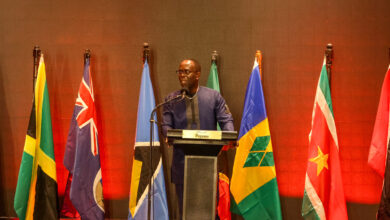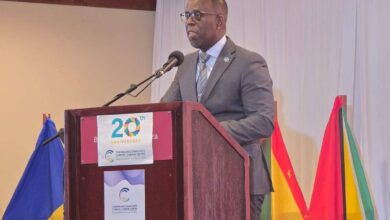SALUTATIONS
I bring you greetings on behalf of my Chairman, Dr Yitades Gebre who could not be here today at this important meeting and sends his regrets.
The HIV/AIDS epidemic in the Caribbean has had, and will have crippling and devastating effects on us all. It is one of the most formidable and daunting challenges to the socio-economic development of the region, and of course, the entire world. It is also addresses the individual rights of all human beings, and thus governments as well as the private sector and civil society, across the Caribbean, must recognize these particular issues and concerns and make it their priority.
We should not slide into complacency by comments that the Caribbean AIDS problem is not comparable to the magnitude of that in sub-Saharan Africa. If we do not challenge the epidemic in full force, and in a most coordinated effort utilize all tangible resources available to us, in a few years the window of opportunity to turn the tide of this epidemic around will be closed. Of course not forever, but at huge cost; cost of life and at an even higher price tag for that of prevention and care interventions. We understand that the epidemic is still in its early stages in some countries, but effective responses are still possible. Its future is in our hands and unless we do more today, right now, the epidemic will continue grow exponentially and soon overwhelm us all.
The Pan Caribbean Partnership Against HIV/AIDS (PANCAP) is an important forum at which to address issues related to an effective regional response in a more coordinated manner, with full and equal partnership of all relevant regional and international stakeholders.
As stated in the Caribbean Regional Strategic Framework for HIV/AIDS, the priority areas for action should start by addressing regional policy and advocacy. Legal and ethical issues, including the call for a concerted effort to reduce stigma and discrimination associated with the infection, and for the greater involvement of people living with HIV/AIDS in all decision-making and implementing issues is one of necessity. Let me commend the efforts made by some government leaders and senior public servants who advocated assiduously to address those concerns and made one step forward in combating stigma and social exclusion in all its forms.
We members of the CCNAPC, affirm that there is an urgent need to coordinate our efforts and work even closer than before with all stakeholders in the region, to respond to the epidemic. We recognize the efforts made by PANCAP and regional institutions such as CAREC and UWI-HARP, and also the international agencies such as UNAIDS, who have worked tirelessly over the past year since our last meeting here in Georgetown. There has been many promising signs and progress made by national governments and non-governmental agencies to address the greatest gap in HIV intervention; that of the treatment, care and support of People Living With HIV/AIDS. However our Coalition is calling for more action, and the scaling up of treatment and care programmes, and to set the ambitious goal of access to anti-retroviral drugs to 100,000 PLWHA in the region by the end of 2005.
There are strong and pertinent lessons to be learnt from Brazil, Thailand, Uganda, Bahamas, Barbados and other counties across the Caribbean which have demonstrated effective ARV access and treatment programmes. At the same time we would like also to work more closely with all the relevant stakeholders to further reduce the cost of the generic and brand name ARV drugs. We believe that there should be publicly assisted HIV/AIDS treatment programmes in accordance with the national health systems in the region.
However we must also remember that prevention and care are inseparable. Preventing an HIV infection is always better, and cheaper, than treating one. The cost of inaction far outweighs the cost of action!!
CCNAPC supports greater cooperation between national programmes and territories. Our recently concluded Peer-to-Peer exchange programme, with the technical and financial assistance of USAID and Synergy is a very good example. It is our plan to extend this programme to all our member countries and territories in the upcoming year. This kind of technical exchange will ensure the uniformity of programme implementation across the Caribbean as well as support the goal and objectives of a real PANCAP through HIV/AIDS interventions.
Our national programme management and technical leadership abilities at a country level need to be enhanced and strengthened, and should be supported by organizing and facilitating the CCNAPC members to participate in strategic alliances and self development. In this regard we appeal to the members of PANCAP to continuously advocate for full participation of CCNAPC and its members in the HIV/AIDS management cycle and regional decision-making.
In conclusion, I would like to reiterate, that CCNAPC is committed to PANCAP and its partners to positioning HIV/AIDS as a social, human rights and health priority in the region. If we stand together, we can this beat this virus and its scourge against humanity at its own game!!
The implementation of simultaneous prevention and treatment programmes saves lives!!
One Love.
Thank you.





